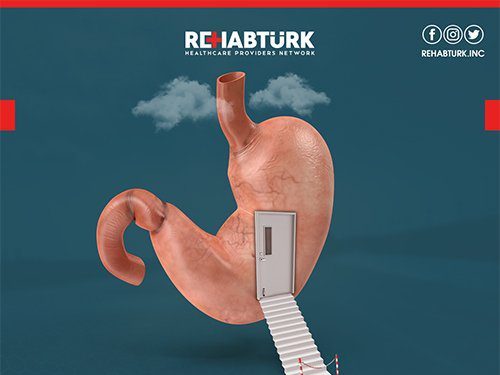Sleeve gastrectomy in Türkiye
Sleeve gastrectomy is done in Türkiye with the aim of treating obesity, and this type of surgery involves removing or reducing the size of the stomach. Bariatric surgery usually leads to rapid weight loss.
Sleeve gastrectomy is one of several types of bariatric surgery options. Medical professionals usually call it a “vertical sleeve gastrectomy.”
What does sleeve gastrectomy mean?

Sleeve gastrectomy is always performed as a non-invasive procedure using a laparoscope. This means inserting a long, thin tube into your abdomen through several small incisions. This tube contains a light and a small camera attached to it as well as various tools.
Sleeve gastrectomy in Türkiye is performed under general anesthesia, which puts the patient in a very deep sleep, and a respirator is used to assist breathing under anesthesia.
The surgery involves dividing the stomach into two unequal parts. Then about 80% of the outer, curved part of the stomach is cut and removed.
The edges of the remaining 20% of the stomach are then sewn together. This results in a banana-shaped stomach that is only about 25% of its original size.
The patient stays in the operating room for about an hour. Once the surgery is complete, he will be taken to the recovery room for postoperative care. He remains in the recovery room for another hour or so until awakening from anesthesia.
Small incisions in the abdomen usually heal quickly. What helps to recover faster is the “minimally invasive” nature of the operation, unlike surgeries in which the abdomen is opened with a larger incision.
The patient should be able to go home within two or three days after surgery unless there are complications.
Is it effective?
Sleeve gastrectomy helps to lose weight in two ways:
- Reducing the size of the stomach, thus feeling full and stopping eating. This means getting fewer calories.
- Removing the part of the stomach that secretes ghrelin – the hormone associated with hunger so that the patient does not feel hungry.
According to the American Society for Metabolic and Obesity Surgery, at least 50 percent of excess weight can be expected to be lost within 18 to 24 months after gastric bypass surgery. And some people lose 60 to 70%.
It is important to know that this will only be achieved if you adhere to the diet and exercise plan recommended by your surgeon. By adopting these lifestyle changes, the new weight is likely to be maintained in the long term.
Weight loss benefits
Losing a significant amount of excess weight improves quality of life and makes it easier to perform many daily activities. Another important benefit of losing weight is a reduced risk of obesity-related health conditions such as:
- Type 2 diabetes
- High cholesterol (hyperlipidemia).
- High blood pressure (hypertension).
- Sleep Apnea.
Who are the candidates for this surgery?
Bariatric surgery of any kind, including gastric sleeve surgery, is only an option when serious attempts to improve diet, exercise, and use of weight-loss medication have not been successful.
even so! The patient must meet certain criteria to be eligible for bariatric surgery. These criteria are based on body mass index ( BMI ) and whether the patient has any obesity-related health conditions.
Conditions that must be met before undergoing gastric sleeve surgery
- “Extremely” morbid obesity (body mass index of 40 or higher)
- Non-morbid obesity (body mass index 35 to 39)
Sleeve gastrectomy is sometimes performed when people are overweight without agreeing to the above conditions but due to a serious weight-related health condition.
What are the risks and complications?
Sleeve gastrectomy is a relatively safe procedure. However, like all major surgeries, there can be risks and complications. Complications can occur after almost any surgery. These include:
- Bleeding _ Internal or external bleeding from the surgical wound can lead to shock when severe.
- Deep vein thrombosis . Surgery and the recovery process can increase the risk of a blood clot forming in a vein, usually in a leg vein.
- pulmonary embolism It is a lung embolism and a pulmonary embolism can occur when part of a blood clot breaks off and travels to the lungs.
- Heartbeat disorder . Surgery can increase the risk of arrhythmias, especially “atrial fibrillation”
- Pneumonia . The pain can cause shallow or shallow breaths, which can lead to infections, such as pneumonia.
Sleeve gastrectomy can have additional complications. Some possible side effects of this surgery include:
Infectious leaks . Stomach fluids can leak from the sutured site where the two sides of the stomach have been sewn back together.
stenosis _ Part of the stomach can close off during gastric sleeve surgery, causing it to become obstructed.
Vitamin deficiency . The removed part of the stomach is partly responsible for absorbing vitamins needed by the body. This may lead to a deficiency unless the patient takes nutritional supplements and vitamins.
Heartburn . Gastric reshaping can cause heartburn or worsen heartburn. This can usually be treated with over-the-counter medications.
It is important for the patient to know that changing their diet and exercise habits are essential to losing weight and keeping it off after gastric bypass surgery.
It is possible to regain weight again if:
- eating a lot
- An unhealthy diet
- Minimize exercise.
Other concerns
Remaining a large amount of excess skin after shedding those extra pounds is a common side effect of sleeve gastrectomy. This excess skin can be removed surgically, but keep in mind that it may take up to 18 months for the body to stabilize after sleeve gastrectomy. This is why it is best to wait before performing a skin removal procedure. Until then, the patient may want to try some techniques to tighten loose skin. Another thing to consider before deciding to have gastric sleeve surgery is that unlike some other bariatric surgeries , gastric sleeve surgery is irreversible! If the patient is not satisfied with the result, the stomach cannot be returned to the way it was.
How does the diet change after gastric bypass surgery?
The patient must agree to make the lifestyle changes recommended by the surgeon before the sleeve gastrectomy. These changes are intended to help the patient achieve and maintain weight loss.
One of these changes involves eating a healthy diet for the rest of your life. The surgeon recommends the best diet for sleeve gastrectomy before and after surgery. The dietary changes your surgeon suggests may be similar to the general dietary guidelines below.
Dietary changes
Two weeks before surgery . Increase protein, reduce carbohydrates, and remove sugar from the diet.
Two days before surgery and the week after surgery . Drink only clear liquids that are free of caffeine and carbonates.
for the three weeks following surgery . Pureed food can be added to the diet.
You will usually be able to eat regular, healthy food about a month after surgery. You will find that you eat less than before the procedure because you will be full quickly and you will not feel hungry.
A restricted diet and smaller meals may cause some nutritional deficiencies. It is important to make up for this by taking a multivitamin, calcium supplement, monthly B-12 injection, and others as recommended by your surgeon.
Briefly
Sleeve gastrectomy is one of several types of bariatric surgery options. And her idea is to make the stomach smaller so that less food can be entered. In parallel with the small size of the stomach, the state of hunger is less.
In order for a patient to be eligible for sleeve gastrectomy, he must meet certain criteria. And the patient may need to try other ways to lose weight including diet, exercise and weight loss medications – but to no avail. Other qualification criteria include BMI and whether the patient has any obesity-related health conditions.
health insurance
In most countries, most health insurance companies recognize that obesity is a risk factor for health conditions and can lead to serious medical problems. For this reason, many insurance companies pay for sleeve gastrectomy when the patient agrees to the terms
According to most Medicare services, gastric sleeve surgery costs are covered when the following conditions are met:
- If your body mass index is 35 or higher.
- There are one or more health conditions associated with obesity
- Inability to lose weight by changing diet, exercising or taking medications
Most sleeve surgery programs do not cover any costs when there is no obesity-related health condition.
Without health insurance coverage, the cost of gastric sleeve surgery can vary greatly from region to region.
Because of this difference, it’s best to research and talk to several surgeons and surgical centers to find a treatment that works for you — and one that works for your budget.
Sleeve gastrectomy in Türkiye
Due to the development of medicine and medicine in Türkiye, it has become a destination for those looking for health and beauty. In addition, sleeve gastrectomy can be obtained with the best Turkish medical expertise and at the best prices
Therefore, you should contact our team of consultants to get the free evaluation and all the details related to the treatment.
How can I book a sleeve gastrectomy in Türkiye?

- Free medical support on the phone: You will have a dedicated representative for your health condition who is always ready to answer your questions.
- Free consultation with a specialist doctor: Your medical representative will consult with a number of doctors and hospitals to find the best possible treatments.
- Free travel visa arrangement: We will contact the embassy in your country to assist you in obtaining a visa to visit Türkiye.
- Free itinerary planning: We will create a schedule for your medical trip to Türkiye.
- Free translation of documents and reports: We will translate medical documents and reports into Turkish on your behalf.
- Free support and monitoring: We will monitor the stages of treatment and be by your side every step of the way.
- Free instant translation: We will be with you during the treatment stages to provide translation between you and the medical team.
- Free accommodation and transportation coordination: We will book accommodation for you and your companions in Türkiye, along with transportation services.
Contact REHABTÜRK doctors for more information about the procedure and to evaluate your medical condition.

